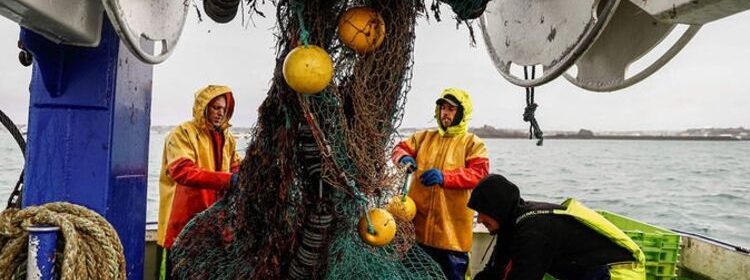Brexit: French fishing authorities ‘seem to enjoy’ enforcing red tape as UK boats struggle

Brexit: Fishing industry was 'sacrificed' by government says Deas
We use your sign-up to provide content in ways you’ve consented to and to improve our understanding of you. This may include adverts from us and 3rd parties based on our understanding. You can unsubscribe at any time. More info
Anger is growing among Britain’s fishing communities as promises made during Brexit negotiations fail to manifest. Now, fishermen are reporting an increasing level of hostility between fishing nations as Brexit rips open divisions in this competitive industry.
France and the UK have been at loggerheads over fishing since the Brexit transition period began.
Tensions flared in October last year after the UK and Jersey denied fishing permits to several French boats.
France responded by threatening to stop British trawlers from landing their catches at French ports unless more permits are granted in return covering UK waters.
Talks have gone some way to resolving the issue, but reports from the ground show how deep tensions run.


Speaking to i, fisherman James Chown described the difficulties faced by the likes of himself in recent months.
He said: “The first time we tried to land pollock in Roscoff, Brittany, we were told to go over to Brest [a port further South], apparently for no reason whatsoever.
“The French seem to enjoy these new regulations.
“We lost about £12,000 worth of fish that day. These days we don’t land in France at all.”
He added: “We were the first boat to land in France after Brexit.
“Complications were immediately there. The French can be very militant.
“If they don’t get their way, they’ve been known to unload fish from lorries and pour diesel on them… set them on fire.”

These alarming tales illustrate just how difficult the situation is for those who depend on fishing for their livelihoods.
Brexit was meant to resolve issues — some 92 percent of fishing communities reportedly voted in favour of Brexit — but fishermen now say they feel like they’ve been duped.
Paul Trebilcock, manager at the 300-year-old Cornish fishing company, Ocean Fish, said: “Senior people from the Government came down here and made us promises.
“We had Michael Gove standing here on the harbour telling us we would have greater control of our seas, and a greater share of fish. Nothing has changed.
“We’re pretty much in the same position as we were before. Maybe we’re a little worse off.”
DON’T MISS:
Here we go again: New Omicron ‘sub-variant’ spreading like wildfire [DATA]
Data shows UK economy rebounding at quickest pace since WW2 [CHARTS]
Cost of living in 2010 vs 2022: How prices have changed [INSIGHT]
He added: “We have been massively short-changed and it does seem like boats down here have been hung out to dry.”
Under the Brexit deal, a five-year period was set out, ending in 2026, during which the UK would gradually gain a greater share of the fish from its own waters.
The quotas were due to be largely transferred to UK boats in 2021, and then staggered until 2026, after which annual negotiations will be held on how the catch is shared between the UK and EU.
The Brexit deal laid out that 15 percent of EU fishing quotas should be transferred to UK boats during 2021, and the species of fish should be shared between the UK and EU during the transition.

But this does not appear to have come to fruition, not has a long-touted promise that waters up to 12 miles from UK land would be reserved for British boats only.
Mr Trebilcock said: “The increase in quota share for various species has been marginal.
“There’s also the issue of the six to 12-mile limit, which we were told would be ours, but that hasn’t happened.”
Fisherman Anthony Hendy said: “The six-mile limit is a big problem for us because a lot of our fleet here is smaller boats which don’t go out in terrible weather – not usually anyway.
“The Belgians and French go out in any conditions because they have huge trawlers subsidised by the Government and it makes no difference to them.
“It’s hard being sat here seeing them coming up within six miles from the coast getting all the fish. That should be ours. It’s not sustainable trawling the seas every day anyway.”
Source: Read Full Article
